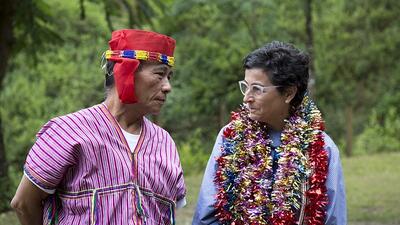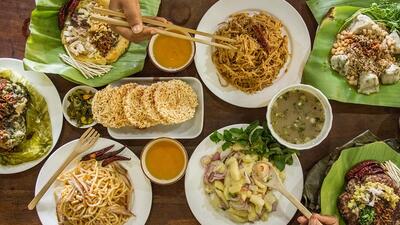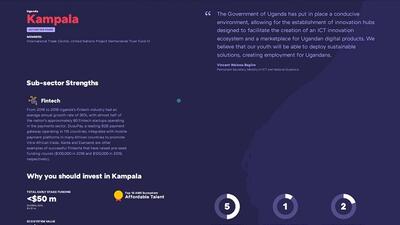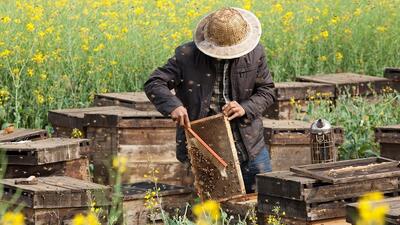Boosting Myanmar’s oilseed exports through better food safety practice (en)
In recent years oilseed farmers in Myanmar have faced increasing challenges related to decreasing yields and unpredictable weather patterns associated with climate change, on top of traditional problems such as limited access to finance.
At the same time, rising international demand for their products offers them new opportunities. To sell into foreign markets, farmers must meet international health and safety standards. This presents them with an additional set of challenges — but also the prospect of higher prices for their crops.
Through a food-safety training initiative led by the International Trade Centre, oilseed producers are finding that attention to hygiene and safe methods of cultivation, storage and processing result in higher-quality foods that draw more buyers, fetch better prices, and increase sales. This also results in safer products for local consumers.
The ITC project, launched in 2015 with the Myanmar Ministry of Commerce and funded by the World Trade Organization’s Standards and Trade Development Facility (STDF), provided food-safety training to about 900 farmers, collectors, and processors of sesame, groundnuts and sunflower crops in central Myanmar. The capacity building initiative also trained a pool of 20 national extension services officers and advisers.
One of the world's largest producers of oilseeds, Myanmar relies on oilseeds as a principal source of export revenue and employment. Oilseeds such as sesame, groundnut, mustard, and sunflower seeds account for roughly 20% of production in Myanmar’s agriculture sector, which employs over half the country’s workforce.
The training programme offered oilseed farmers, intermediary collectors and processors instruction and tools on how to grow crops, use pesticides safely, and collect, store and process seeds under hygienic conditions. The objective was to help their products meet international requirements for certification verifying compliance with sanitary and phytosanitary standards (SPS), Good Agricultural Practices (GAP), and Codex Alimentarius General Principles of food hygiene.
“Since I began following the good storage practices, my Japanese clients are buying more and more of my product. In fact, I must now find new sources to meet the increased demand,” said U Nyan Lwin, owner of Lwin Phyo Warehouse, a beans and sesame seed trading business in Aunglan township in Myanmar’s central Magway region.
Mr. Nyan’s warehouse now features ‘Good Hygiene and storage Practices’ posters on the walls that have impressed his Japanese buyers. “They have been my regular customers for the past ten years. Now that they are increasing their orders for GAP products, I can pay farmers a higher price for their seeds,” he said.
Since the programme’s completion in March 2019, 150 farmers have obtained the national GAP certification and seven processors received internationally recognized certification for establishing food safety control systems that meet the Hazard Analysis and Critical Control Point (HACCP) requirements.
At the project’s closing workshop in Yangon, about 100 project participants and beneficiaries from the oilseeds sector gathered to share results and lessons learned.
“The project provided valuable knowledge for farmers, collectors, millers and exporters along the value chain to improve significantly the quality management in Myanmar’s oilseeds industry,” said Ministry of Commerce Permanent Secretary Aung Soe.
He noted the programme had promoted collaboration among oilseed stakeholders and contributed to achieving the five-year objectives identified in Myanmar’s national export strategy (NES), a government policy document that identifies high-impact reforms to catalyse export-driven growth and job creation. ITC, which supported Myanmar to develop the NES, has worked with the government to promote support for the country’s oilseeds industry and ensure maximum return on investments in terms of oilseed exports and jobs.
U Thet Htun Lwin, owner and CEO of Golden Taste Company Limited, proudly exhibited his peanut and sesame oil products at the workshop. “This project has improved everything in my business. We have changed all procedures in my factories to improve food safety, and our workers now follow the good hygiene practices throughout the whole production process,” he said. “This has resulted in so much improvement in our products.”
“ITC’s value-chain approach linking farmers, collectors, processors and local advisers to each other and to final buyers was new to Myanmar when the project started”, said Ludovica Ghizzoni, ITC adviser and project manager. “It proved to be a good foundation for stakeholders to improve their practices.”
Myanmar and ITC have identified future interventions to build on the results achieved in the oilseeds sector.











